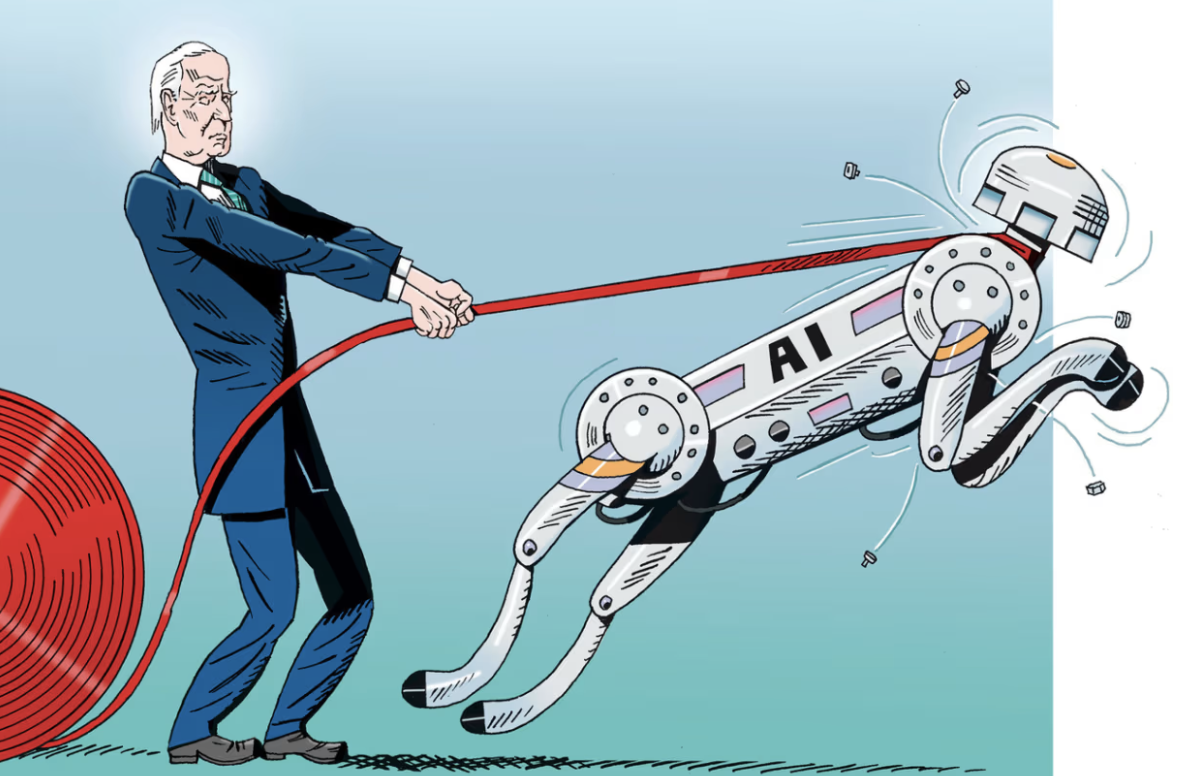By: Ted Cruz and Phil Gramm – wsj.com – March 25, 2024
Bill Clinton’s regulators, by contrast, produced prosperity by encouraging freedom on the internet.
The arrival of a new productive technology doesn’t guarantee prosperity. Prosperity requires a system, governed by the rule of law, in which economic actors can freely implement a productive idea and compete for customers and investors. The internet is the best recent example of this. The Clinton administration took a hands-off approach to regulating the early internet. In so doing it unleashed extraordinary economic growth and prosperity. The Biden administration, by contrast, is impeding innovation in artificial intelligence with aggressive regulation. This could deny America global leadership in AI and the prosperity that leadership would bring.
The Clinton administration established a Global Information Infrastructure framework in 1997 defining the government’s role in the internet’s development with a concise statement of principles: “address the world’s newest technologies with our Nation’s oldest values . . . First, do no harm.” The administration embraced the principle that “the private sector should lead [and] the Internet should develop as a market driven arena, not a regulated industry.” The Clinton regulators also established the principle that “government should avoid undue restrictions on electronic commerce, . . . refrain from imposing new and unnecessary regulations, bureaucratic procedures or new taxes and tariffs.”
That regulatory framework faithfully fleshed out the provisions of the bipartisan 1996 Telecommunications Act and provided the economic environment that made it possible for America to dominate the information age, enrich our lives, create millions of jobs, and generate enormous wealth for retirement savers.
The Biden administration is doing the opposite. It has committed to “govern the development and use of AI.” In one of the longer executive orders in American history, President Biden imposed a top-down, command-and-control regulatory approach requiring AI models to undergo extensive “impact assessments” that mirror the infamously burdensome National Environmental Policy Act reviews, which are impeding semiconductor investment in the U.S. And government controls are permanent, “including post-deployment performance monitoring.”
Under Mr. Biden’s executive order, AI development must “be consistent with my administration’s dedication to advancing equity and civil rights” and “built through collective bargains on the views of workers, labor unions, educators and employers.” Mr. Biden’s separate AI Bill of Rights claims to advance “racial equity and support for underserved communities.” AI must also be used to “improve environmental and social outcomes,” to “mitigate climate change risk,” and to facilitate “building an equitable clean energy economy.”
Education Secretary Miguel Cardona, who as Connecticut schools commissioner said “we need teachers behind this wave of our curriculum becoming more woke,” now wants to impose “guardrails” on AI to protect against “bias and stereotyping through technology.” The Commerce Department has appointed a “senior adviser for algorithmic justice,” while the Justice Department, Federal Trade Commission, Consumer Financial Protection Bureau and the Equal Employment Opportunity Commission have issued a joint statement asserting legal authority to root out racism in computing.
FTC Chairwoman Lina Khan has launched several AI-related inquiries, claiming that because AI “may be fed information riddled with errors and bias, these technologies risk automating discrimination—unfairly locking out people from jobs, housing and key services.”
Regulating AI to prevent discrimination is akin to the FTC’s regulating a cellphone’s design to enforce the do-not-call registry. There is virtually no limit to the scope of such authority. Under what constitutional authority would Congress even legislate in the area of noncommercial speech? How could the FTC regulate in this area with no legislative authority? But in the entire Biden administration, noted for governing through regulatory edict, no agency has been less constrained by law than the FTC.
Others demanding control over AI’s development include the progressives who attended Sen. Chuck Schumer’s recent AI “Insight Forums.” Janet Murguía, president of UnidosUS—the activist group formerly known as the National Council of La Raza—demanded “a strong voice in how—or even whether” AI models “will be built and used.” Elizabeth Shuler, president of the AFL-CIO, demanded a role for “unions across the entire innovation process.” Randi Weingarten, president of the American Federation of Teachers, said, “AI is a game changer, but teachers and other workers need to be coaches in the game.”
Particularly painful is Mr. Biden’s use of the Defense Production Act of 1950 to force companies to share proprietary data regarding AI models with the Commerce Department. That a law passed during the Korean War and designed for temporary national security emergencies could be used to intervene permanently in AI development is a frightening precedent. It begs for legislative and judicial correction.
What’s clear is that the Biden regulatory policy on AI has little to do with AI and everything to do with special-interest rent-seeking. The Biden AI regulatory demands and Mr. Schumer’s AI forum look more like a mafia shakedown than the prelude to legitimate legislation and regulatory policy for a powerful new technology.
Some established AI companies no doubt welcome the payment of such tribute as a way to keep out competition. But consumers, workers and investors would bear the cost along with thousands of smaller AI companies that would face unnecessary barriers to innovation.
Letting the administration seize control over AI and subject it to the demands of its privileged political constituencies wouldn’t eliminate bias, stereotyping or the spreading of falsehoods and racism, all of which predate AI and sadly will likely be with us until Jesus comes back. Mr. Biden’s policies will, however, impede AI development, drive up the costs of the benefits it brings, and diminish America’s global AI pre-eminence.
Mr. Cruz is ranking Republican on the Senate Commerce Committee. Mr. Gramm, a former chairman of the Senate Banking Committee, is a visiting scholar at the American Enterprise Institute.
To see this article in its entirety and to subscribe to others like it, please choose to read more.
 Listen Online
Listen Online Watch Online
Watch Online Find a Station in Your Area
Find a Station in Your Area









 Listen Now
Listen Now Watch Online
Watch Online
